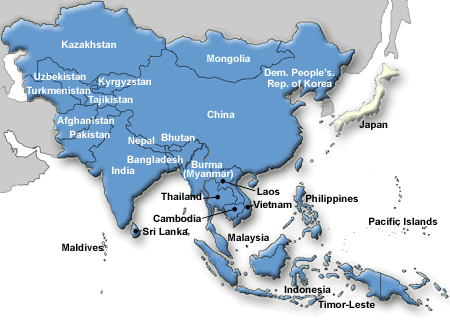Asia seeks a bigger say in global financial cleanup
 Bangkok - Six months ago, when the financial crisis started in US and European markets, there was still hope that South-East and East Asia would prove immune to the latest hiccup in capitalism.
Bangkok - Six months ago, when the financial crisis started in US and European markets, there was still hope that South-East and East Asia would prove immune to the latest hiccup in capitalism.
The region suffered its own financial crisis in 1997-98 when weak financial systems, overborrowing and ballooning current account deficits led to plummeting currencies, widespread bankruptcies, mountains of private and public debt, and a massive financial cleanup sponsored by the International Monetary Fund (IMF) and pushed by the West.
"There is a sentiment that this region has learned its lesson," said Tiziana Bonapace, chief economist for the UN Economic and Social Commission for Asia and the Pacific.
"It's reformed the banking sector, built up its reserves and its capital adequacy ratios, dealt with the excessive short-term debt, restructured its toxic assets, so overall, the financial sector looked resilient," Bonapace said.
So it did, until Asian exports started to tumble 20 to 30 per cent in January as the region's major markets - the United States and European Union - dried up.
"It's really becoming a trade crisis, and this is worrisome," Bonapace added. It was exports, after all, that allowed the East Asian economies to bounce back from the 1997-98 crisis.
With the region's exports now on the slide, unemployment on the rise, and bankruptcies and non-performing loans starting to mount, it seems only a matter of time before the US-led financial crisis turns into another financial crisis for Asia.
There is some irony here.
"In 1997-98, the message to us was we should try to make our financial systems more like the advanced economies because that was best practice," said Chalongphob Sussangkam, lead economist at the Thailand Development Research Institute, a think tank.
"But having made the reforms, now we are not sure what the best practice is," Chalongphob said.
Chalongphob was one of several eminent Asian economists attending an Asian Development Bank seminar in Tokyo last week on East Asia's message to the Group of 20 (G20) ahead of its April 2 summit.
The meeting of the world's 19 largest economies and the European Union in London is to include leaders from several Asian countries, including China, India, Indonesia, Japan, South Korea and Thailand in its capacity at chair of the Association of South-East Asian Nations (ASEAN).
The feeling is that Asia has earned a right to a greater say in cleaning up the current mess.
East Asia, after a decade of fast-paced, export-led growth, has accumulated the world's largest stash of foreign exchange reserves in US dollars along with vast investments in US government bonds, making it the main creditor region for the United States.
Understandably, there are fears that the US stimulus plans, requiring printing money and offering new bonds, would lead to declines in the dollar's value.
"With the subprime crisis, I think it's very important that the creditor countries take an active role in any reform of the international financial architecture, because, otherwise, if you let the people who created the problems reform the system, it will not happen," Chalongphob said.
Besides calling for a greater say in reforming the global financial system, there are several other points the Asian leaders are likely to stress at the G20.
The first is the need to prevent protectionist trends.
Asia's export-led economies would be among the hardest hit if protectionism proliferates.
Another major topic for discussion promises to be boosting funding for the IMF and World Bank.
Thai Prime Minister Abhisit Vejjajiva has vowed to push for fewer conditions on future IMF and World Bank loans to developing countries.
That message harkens back to the 1997-98 Asian financial crisis when the IMF bailed out hard-hit economies such as Thailand but imposed conditions that included limits to fiscal spending.
Abhisit leads the Democrat Party, which was also in power during the 1998-2001 cleanup years and suffered political unpopularity after listening to IMF advice. Even the IMF later admitted it got it wrong in advising fiscal austerity in East Asia.
Abhisit was also likely to seek G20 endorsement for ASEAN's Chiang Mai Initiative, a supplementary IMF-type
120-billion-dollar fund that is designed to specifically help economies in South-East and East Asia should they run into liquidity problems.
The fund was once deemed controversial because of Western concerns about "moral harzard," or fears that not enough conditions would be placed on borrowing nations.
"But no one is talking about moral hazard nowadays," Chalongphob said. "That word has dropped right out of the picture." (dpa)